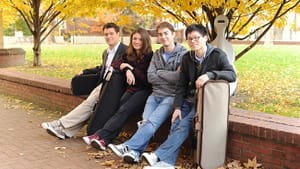Stay in the Loop
BSR publishes on a weekly schedule, with an email newsletter every Wednesday and Thursday morning. There’s no paywall, and subscribing is always free.
Curtis scores again
Dover Quartet at the Perelman

Whenever I pass by the staid and noble building of the Curtis Institute or attend one of the concerts in its Field Concert Hall, I pause for a moment in awe of the sheer number of world-class musicians who have emerged and taught there, as well as its profound influence on modern music. This concert by the Dover Quartet and baritone Jarrett Ott was infused with the Curtis aura. The composer Eric Sessler is a Curtis graduate and faculty member; Samuel Barber was a Curtis alumnus, and his lover, another great composer, Gian Carlo Menotti, also graced the halls of Curtis; other Curtis associations abounded— for example, the inevitable comparison and mutual influence of Barber’s song style with that of fellow Curtis alumnus Ned Rorem.
The Dover’s four musicians, of course, studied at Curtis and now serve as artists in residence. But the Curtis connection wasn’t merely coincidental to this performance. It lent the concert a genuine feeling of organic wholeness that contrasted favorably with the more typical pastiche of compositions linked by one superficial element or another.
The Dover Quartet is also awesome in its own way. Its members were just 19 years old when they formed the Quartet at Curtis in 2008, and by appearance they still look like kids in comparison with the other more mature musicians on the programs of the Philadelphia Chamber Music Society. But in some respects they quickly race by the distinguished veteran quartets like the Juilliard, Emerson and others that have set the gold standard for such ensembles. Possibly because for them the music is so fresh, they play with exceptional cleanness, clarity and coordination, and they seem almost effortlessly to take the listener immediately into the depths of the music.
(Their impeccable precision may also reflect the fact that they grew up with digital recording, which can be unforgiving of blurred articulation.)
Sessler's unique contribution
Their rendering of the Beethoven Opus 135 Quartet was refined yet intense, transparent yet searching. It’s a piece that contrasts with other late Beethoven quartets in its relative simplicity and melodic emphasis, with less of the tumultuous counterpoint and percussive tenseness of a composer aiming, in his own words, to write music worthy of God, while personally enduring the hellish confines of total deafness. In particular, the melodic turn is what links the Beethoven work to those of Sessler and of Barber that followed.
Eric Sessler may prove to be the American composer of his generation capable of linking together the contrasting strains of post-romantic melody and harmony with the post-modern manipulations of Steve Reich, Phillip Glass, John Adams and others. His “Quartet” began as an extension of and homage to Barber’s classic sense of beauty and developed seamlessly into an intelligent use of slurring, harmonic alterations, and Nietszche-via-Reik’s eternal recurrence. Here, Sessler achieved a delicate balance between the rounded romantic development of mood and motif and a post-modern sense of music that’s paradoxically linear in its non-linearity and constant in its change— a song without a singer.
Once again, as in the Beethoven Opus 135, the melodic line rather than contrapuntal interaction is central. Sessler’s music flowed like a river that cascades over waterfalls and moves around in eddies and undercurrents.
Barber’s Dover Beach and his String Quartet are American classics that rank among those which earned him a place among the great 20th Century composers. The lyrics of Dover Beach consist of Matthew Arnold’s poem. Both words and music convey a profound sadness and disillusionment which, for Arnold, resulted from the loss of faith and values that he perceived in Western civilization. The music evokes the quality of a lament, moving down the scale at the end of many lines and coming to a death-like rest at the end. Arnold’s language is high English, while Barber’s music is distinctively that of American hymns.
Grief and despair
A clash of two cultures occurs in this piece, but in the end, a unified mood is sustained, partly by Barber’s use of music as metaphor for the ocean’s roar and waves beating upon the shore, and partly by the mourning that pervades every word, image, and musical phrase.
Young Jarrett Ott’s strong yet resilient baritone voice conveyed grief and existential despair in a way that equaled and in some ways exceeded the stirring interpretation of the far more experienced and mature Dietrich Fischer-Dieskau in a recorded version with the Juilliard Quartet.
The Barber Quartet contains the beautiful Adagio for Strings that Toscanini first performed in an arrangement for full orchestra. The string quartet version is stunning for its simplicity, and the listener can hear subtle nuances better than in the orchestral version. Its placement within three movements frames it and makes it part of a narrative of shifting moods— a Barber hallmark.
The Dover Quartet performed the work in a coherent fashion, careful not to exaggerate the passages of the Adagio movement. Throughout the concert, the musicians displayed an emotional depth that escapes some ensembles of greater age who should know better.
Barber and his critics
All the compositions in this set place great emphasis on melodic lines that are then developed harmonically and conceptually. All contain an element of sadness and grief mixed with vigor and joy, although the Beethoven also included lilting folk melodies that added a dance-like twist. All the pieces were by and large more flowing than percussive, and this is especially striking for Beethoven, who loved to include abrupt stops and starts and sharp staccato passages, especially in the late quartets.
Barber is often criticized by the modernists for overplaying melodic beauty at the expense of what could be communicated by dissonance and disarray, not to mention stretching the limits of harmony to the breaking point. Some of this critique ignores the fact that melody is too often equated with a “tune” or leitmotif reiterated in variations and elaborations. In truth, melody can be just as complex and extensive as any other aspect of musical expression.
Think of the medieval plainsong and Gregorian chant, where melodic lines are the sole medium of expression, with long, flowing undulations rather than stated themes and variations. It could be argued that Barber advanced music forward by going back to these roots. Through their unrivaled use of all the possibilities of melody and song, Barber and Ned Rorem added a dimension to modern music that others had all but forgotten.
What, When, Where
Dover Quartet: Beethoven, Quartet in F Major, Op. 135; Sessler, Quartet; Barber, Dover Beach, Op. 3; Barber: Quartet, Op. 11. Jarrett Ott, baritone. December 4, 2013 at Perelman Theater, Kimmel Center, Broad and Spruce Sts. (215) 569-8080 or www.pcmsconcerts.org.
Sign up for our newsletter
All of the week's new articles, all in one place. Sign up for the free weekly BSR newsletters, and don't miss a conversation.

 Victor L. Schermer
Victor L. Schermer